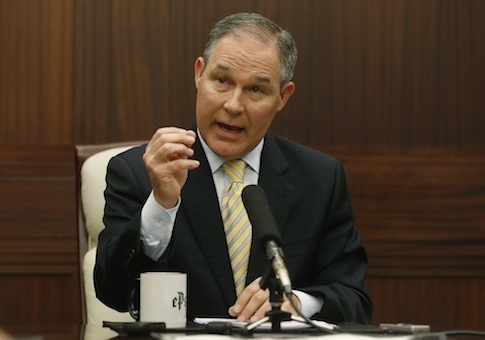Twelve states attorneys general will file a federal lawsuit against the Environmental Protection Agency Tuesday, saying the EPA improperly denied public records requests regarding the agency’s controversial "sue and settle" practice.
Led by Oklahoma Attorney General Scott Pruitt, the states are seeking to obtain records on lawsuits by environmental groups that led to new regulations.
The states filed a FOIA request in August 2012, but the EPA denied not only their records request but also a request for a fee waiver.
The states requested documents involving several environmental groups, including Greenpeace, Defenders of Wildlife, WildEarth Guardians, Sierra Club, and the AFL-CIO.
Republicans and conservative groups allege environmental groups and the EPA are using lawsuits to craft new regulations that impact states while not allowing input from states.
In some instances, the EPA filed a "consent decree" agreeing to new regulations on the same day the lawsuits were filed, leading critics to suspect prior knowledge.
"This appears to be a blatant strategy by the EPA to go around the process and bend the rules to create environmental regulations that have failed in Congress," Pruitt said. "As part of our investigation into the pervasiveness of this tactic, we requested documents that the EPA has refused to produce. If the EPA is making backdoor deals with environmental groups to push their agenda on the American people while bypassing the states and Congress, we need to know."
The other 11 states joining Oklahoma in the lawsuit are Alabama, Arizona, Georgia, Kansas, Michigan, Nebraska, North Dakota, South Carolina, Utah, Wyoming, and Texas.
Twenty-one states wrote to the EPA in June asking it to avoid "sue and settle" lawsuits.
Conservative groups have repeatedly alleged EPA’s FOIA practices are biased against them, specifically the approval or denial of fee waiver requests.
A study by the Competitive Enterprise Institute found that the EPA granted FOIA fee-waiver requests to environmental groups 92 percent of the time, while denying fee waiver requests to conservative and free-market critics 93 percent of the time.
CEI reported the Natural Resources Defense Council, Sierra Club, Public Employees for Environmental Responsibility, and EarthJustice had fees waived in 75 out of 82 cases.
The EPA denied CEI senior fellow Chris Horner’s request for fee waivers in 14 of 15 FOIA requests during the same time.
Sen. David Vitter (R., La.) applauded the 12 states’ attorneys general in a statement Tuesday and said the EPA’s actions showed the need for more transparency at the agency.
"The numbers don’t lie. Looking at FOIA fee waivers, it’s clear that EPA favors far-left environmentalist groups over conservative think tanks, but today’s lawsuit is just another example demonstrating EPA’s discrimination extends toward states, as well," Vitter said. "We recently got the EPA to agree to completely retrain their staff on FOIA practices and issue new agency-wide guidance on FOIA practices following completion of the inspector general investigation. However, their obstructionist tactics while trying to bend FOIA laws remains a problem, especially when they seek to block attorneys general who clearly are acting to advance the public interest."
Following complaints from Sen. Vitter about its transparency, the EPA announced last week it will retrain its more than 17,000 employees on FOIA compliance and records management.
According to the EPA website, fee waivers are granted when the agency determines the "disclosure of the requested information is in the public interest because it is likely to contribute significantly to public understanding of the operations or activities of the government and is not primarily in the commercial interest of the requester."
Pruitt’s office said a report on the documents, if obtained, will be disseminated to the states, news media, and Congress.
The EPA was not immediately available for comment.
